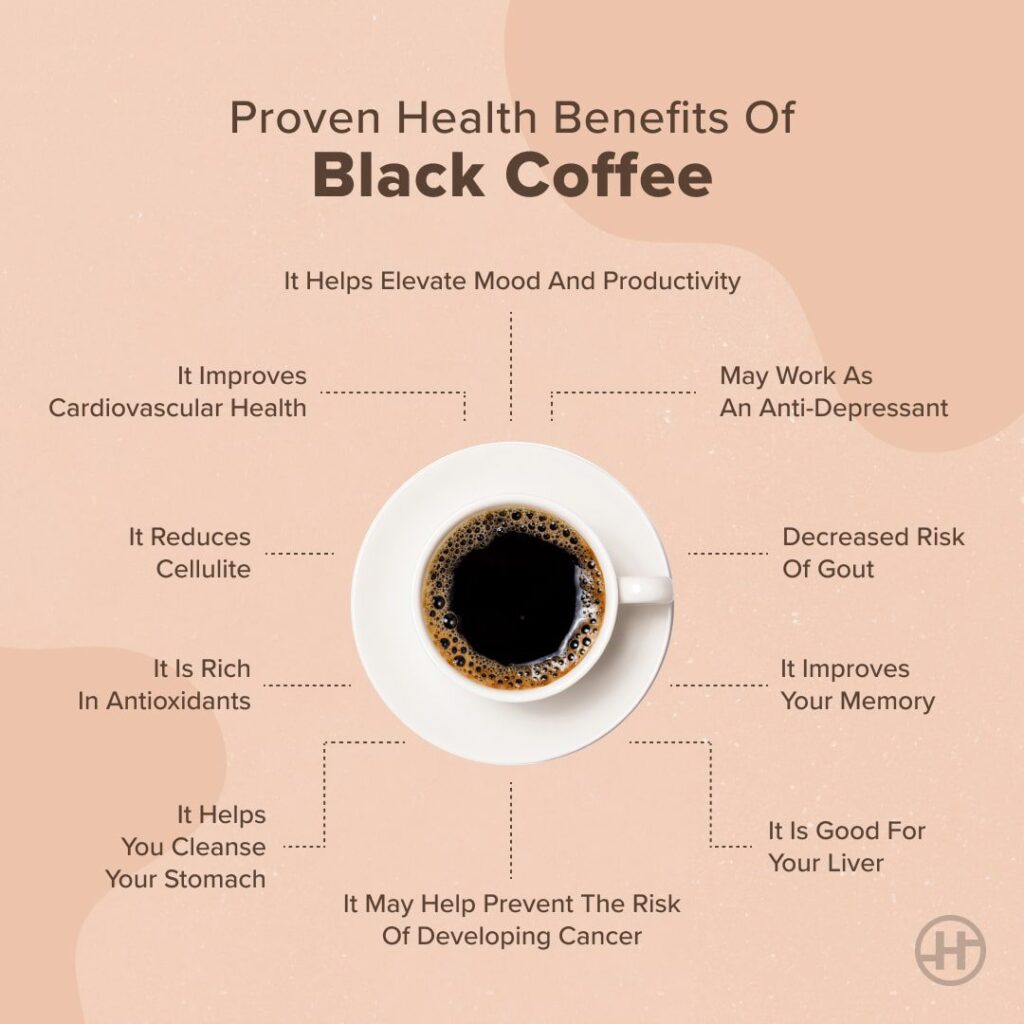Coffee is a beloved beverage that is consumed by millions of people worldwide. It’s not just a delicious pick-me-up in the morning, but it also offers several potential health benefits.
From boosting your energy levels to improving cognitive function, coffee has been linked to various positive effects on the body.
However, like any other consumable, there are also potential drawbacks to be aware of. This article will explore the health benefits and drawbacks of drinking coffee, helping you make informed decisions about your daily caffeine fix.
Health Benefits of Drinking Coffee
Boosts energy and alertness
Coffee is well-known for its ability to boost energy and alertness. Caffeine stimulates the central nervous system, making you more awake and alert. It blocks the adenosine receptors in the brain, which promote sleepiness. By doing so, coffee helps you stay awake and focused, especially during the morning or when you’re tired.
It may enhance physical performance.
Not only does coffee give you an energy boost, but it can also enhance physical performance. Caffeine caffeine has been shown to increase endurance, improve muscle contractions, and reduce perceived effort during exercise. It stimulates the release of adrenaline and increases the breakdown of stored fat, making it an effective tool for athletes and those engaging in physical activities.
Contains essential nutrients
Coffee isn’t just a source of caffeine; it also contains essential nutrients. Coffee can provide essential nutrients such as riboflavin (vitamin B2), pantothenic acid (vitamin B5), manganese, potassium, and magnesium. While these amounts may not be significant, every little bit helps meet your daily nutrient needs.
It may lower the risk of certain diseases.
Research suggests that coffee consumption is associated with a lower risk of certain diseases. Drinking coffee has been linked to a reduced risk of developing type 2 diabetes, Parkinson’s disease, and liver disease, including cirrhosis and liver cancer. The antioxidants and beneficial compounds in coffee may protect against these diseases and promote overall health.
It may protect against mental decline.
As we age, cognitive decline and neurodegenerative diseases become a concern. However, coffee may offer some protection against mental decline. Studies have found that regular coffee consumption is associated with a lower risk of developing Alzheimer’s and dementia. The caffeine and other bioactive compounds found in coffee have neuroprotective effects, helping to keep the brain healthy and functioning correctly.
Can improve mood and mental well-being
A warm cup of coffee is often associated with comfort and relaxation but can also positively impact your mood and mental well-being. The caffeine in coffee acts as a mild stimulant, boosting the release of neurotransmitters like dopamine and serotonin, which are associated with mood regulation. This can help improve mood, reduce the risk of depression, and increase feelings of well-being.
It may reduce the risk of stroke.
Drinking coffee in moderation has been linked to a reduced risk of stroke. Research suggests regular coffee consumption can decrease the risk of ischemic and hemorrhagic strokes. The antioxidants in coffee and its ability to improve blood vessel function may contribute to this protective effect. However, it’s important to note that excessive coffee consumption can have the opposite effect and increase the risk of stroke.
It may lower the risk of liver diseases.
Your liver plays a crucial role in detoxification and overall health. Fortunately, coffee may help protect your liver from certain diseases. Studies have shown that regular coffee consumption can lower the risk of liver diseases such as liver cirrhosis, hepatitis, and liver cancer. The antioxidants and other biologically active compounds in coffee may help reduce inflammation, prevent liver damage, and promote healthier liver function.
Can aid in weight loss
Coffee can be helpful if you’re looking to shed a few pounds. The caffeine content in coffee has been shown to boost metabolism and increase fat burning. It can also suppress appetite and reduce calorie intake, making you feel full for more extended. These effects can contribute to weight loss combined with a balanced diet and regular exercise. However, avoiding excessive amounts of sugar, cream, or other high-calorie additives in your coffee is essential, as this can counteract its weight loss benefits.
Drawbacks of Drinking Coffee
This can lead to addiction and dependency.
One of the drawbacks of drinking coffee is that it can lead to addiction and dependency. Regular consumption of coffee can cause physical and psychological dependence on caffeine. When you consume caffeine regularly, your body adapts to its effects, requiring increasing amounts to achieve the same results. The withdrawal symptoms from quitting coffee include headaches, fatigue, irritability, and difficulty concentrating. It’s essential to be mindful of your caffeine intake and consider reducing or moderating your consumption if you become reliant on it.
May cause sleep disturbances
While coffee can keep you awake and alert during the day, it can also disrupt your sleep at night. Consuming coffee, especially in the evening or close to bedtime, can interfere with sleep quality and duration. The stimulating effects of caffeine can make it more difficult to fall asleep, leading to insomnia or restless sleep. It’s advisable to avoid consuming coffee several hours before bedtime to ensure better sleep hygiene and promote restful sleep.
It can increase anxiety and restlessness.
Individuals more sensitive to caffeine may experience increased anxiety and restlessness when consuming coffee. The stimulant effects of caffeine can cause a temporary increase in heart rate, jitteriness, and a feeling of being on edge. If you are more prone to anxiety or have a pre-existing anxiety disorder, limiting or avoiding caffeinated beverages may be best to prevent exacerbating these symptoms.
It may cause digestive issues.
Coffee can stimulate the digestive system, and for some individuals, this can lead to digestive issues. Caffeine caffeine can increase stomach acid production, which may worsen symptoms of acid reflux, heartburn, or gastritis. Additionally, coffee can act as a mild laxative, stimulating the muscles in the digestive tract and potentially causing diarrhea or loose stools. If you experience digestive discomfort after consuming coffee, it may be helpful to reduce your intake or opt for decaffeinated alternatives.
It can worsen heartburn and acid reflux.
Drinking coffee can exacerbate these symptoms for individuals who already suffer from heartburn or acid reflux. The high acid content of coffee can irritate the esophagus and the lower esophageal sphincter, leading to a flare-up of heartburn or reflux. This can cause a burning sensation in the chest, discomfort, and regurgitation of stomach acid. If you have acid reflux or a history of heartburn, it’s advisable to limit your coffee intake or try less acidic options such as cold brew or adding milk to lower the acidity.
It may increase blood pressure.
Coffee consumption, especially in large amounts, has been associated with a temporary increase in blood pressure. Caffeine caffeine can constrict blood vessels, leading to higher blood pressure readings. While the effects are usually temporary, individuals with high blood pressure or those sensitive to caffeine may experience a more pronounced increase. If you have hypertension or are prone to high blood pressure, you should monitor your caffeine intake and consult your healthcare provider to determine a safe limit.
Can contribute to dehydration
Coffee’s diuretic effects have led to concerns about its potential to contribute to dehydration. However, current research suggests moderate coffee consumption does not significantly dehydrate the body. While coffee does have a mild diuretic effect, the water content of the beverage still contributes to your overall hydration status. Balancing your coffee intake with drinking enough water throughout the day is crucial to maintain proper hydration.
May lead to bone loss
Excessive coffee consumption has been associated with a higher risk of bone loss and osteoporosis. The compounds in coffee, such as caffeine and certain acids, can interfere with calcium absorption and increase calcium excretion through urine. Over time, this can contribute to decreased bone density and an increased risk of fractures. Limiting your coffee intake is advisable, especially if you have a history of osteoporosis or are at a higher risk of bone-related issues.
May affect fertility
Some studies suggest excessive coffee consumption, particularly in women, may hurt fertility. High levels of caffeine intake have been associated with delayed conception and an increased risk of miscarriage. However, it’s important to note that the effects may vary depending on individual sensitivity and other factors. If you’re trying to conceive or have concerns about fertility, it may be beneficial to reduce your coffee intake or switch to decaffeinated options.
Can stain teeth
Lastly, one typical drawback of drinking coffee is its potential to stain teeth. The dark pigments in coffee can adhere to the enamel of your teeth and cause discoloration over time. Regular consumption, especially without proper oral hygiene, can lead to yellowing or stained teeth. To minimize staining, brushing your teeth after consuming coffee or using a straw to bypass direct contact with your teeth is recommended.
Conclusion
Coffee, when consumed in moderation, can offer several health benefits. It can boost energy, enhance physical performance, provide essential nutrients, lower the risk of certain diseases, protect against mental decline, improve mood and well-being, reduce the risk of stroke and liver diseases, prevent certain cancers, and aid in weight loss. However, it’s essential to be aware of the potential drawbacks of coffee, such as addiction, sleep disturbances, increased anxiety, digestive issues, heartburn, elevated blood pressure, dehydration, bone loss, fertility concerns, and teeth staining. As with any food or beverage, it’s essential to listen to your body, be mindful of your consumption, and make informed choices that best suit your needs and health goals.








































